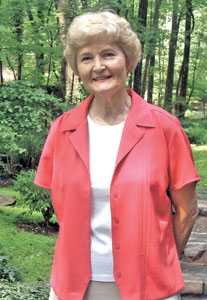The Mistress of Moss
Each year, plant enthusiasts make pilgrimages to Norie (Riddering) Burnet’s garden, Eden Woods, where the superstar plant is one that’s more often poisoned or yanked out than it is revered.


Norie (Riddering) Burnet ’52 still remembers one of her first encounters with plant life. She was visiting the Bronx Zoo with her mother and baby brother, and as other children gawked at the tigers and monkeys, a three-year-old Burnet wandered over to the grass and plucked a stray violet she’d spotted. Her mother scolded her, pointing to a sign that read, “Do not pick the flowers,” and tucked the renegade blossom into the hood of her younger child’s baby carriage.
“I remember thinking that plants must be pretty important if you could get in trouble for picking them,” Burnet says now. “I took that little violet home to our New York City apartment and held onto it. I wanted to keep it forever, but of course it didn’t survive.”
Still, that early experience sparked a passion for plants and gardening that still burns brightly nearly 80 years later. It’s a passion that has helped Burnet earn the definitive title of “The Moss Lady” and has led her Richmond, VA, garden, Eden Woods, to several major horticultural awards. It’s also turned her garden into a point of national interest: over the years, it’s appeared in numerous magazines and newspapers, was featured on an HGTV program called A Gardener’s Diary, and has even been documented in the Smithsonian’s Archives of American Gardens.
Hundreds of plant enthusiasts make pilgrimages to visit Eden Woods each year, consistently impressed by its sprawling, cushy moss and hundreds of vivid shade plants. “I think a garden is there for sharing, and that’s what I try to do,” Burnet says. “To me, this is truly a garden of Eden, and it’s become a garden of Eden to so many visitors who come here. They say it’s like walking into a terrarium—so lush, so green, and also so inviting and peaceful.”
But in Burnet’s four-acre property and three-quarter-acre garden, the superstar plant is one that’s typically cast as a villain—more often poisoned or yanked out than it is revered. And when she moved into her woodsy Richmond

home about 30 years ago, Burnet says that’s how she felt about moss, too. “I had the mindset that moss belongs in the woods, not your garden,” she says. “I spent years trying to get rid of it, but one day, one of my sons said, ‘Moss is so pretty, Mom. Why don’t you just let it be?’ I didn’t really cotton to that idea, but I started taking a new look at the moss and cultivating it slowly in certain areas. I found that it was really returning a lot of beauty to me, and the rest is history—it just went off from there.”
Letting moss take the place of grass, Burnet began slowly to fill her garden and yard with dozens of other shade-loving plants: magnolias, hollies, ferns, azaleas. “When I first moved here, it was pretty much a benign jungle,” she says. “There was really no garden to work with. I decided to take it one step at a time. I’ve learned that’s the best way to do everything: Don’t focus on the enormity of what you want to do, just focus on making one area at a time pristine and beautiful and it will eventually all come together.”
When she retired from teaching about 15 years ago, she was able to devote even more time and energy to gardening, and though she’s 81 now, Burnet still maintains Eden Woods and her four acres of property mostly by herself. “I feel like an imposter because I don’t feel 81,” she says. “The garden has kept me young and vibrant.”
Gardening also satisfies her artistic side. “I dearly love art and classical music, and I’ve sold a number of my paintings,” she says. “But painting takes a lot of time and energy, and I can’t do that and garden. At a certain point, I just figured there were plenty of great painters out there, but not a lot of moss gardeners.”
Take a photo tour of Eden Woods. Click on any image below to view it larger.
- Norie in her Norsworthy Hall dorm room in 1949.
Posted on November 1, 2011




